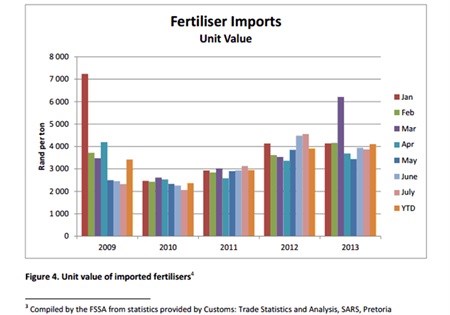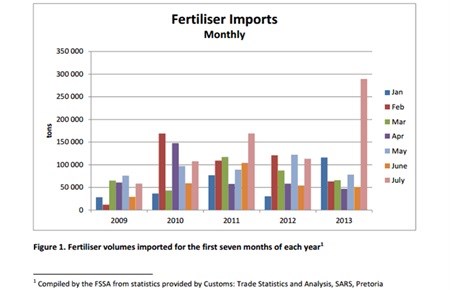Large, international companies entering the South African fertiliser market has led to fierce competition in the industry, says Frank Winder, managing director of sustainable agricultural products provider Advanced Nutrients.

© sherez - Fotolia.com
"I have almost lost count of the amount of fertiliser companies coming into South Africa. It seems as if there is a new one each week, and they are sending thousands of tons per shipment," he says.
According to a report by Adam Mostert, CEO of the Fertiliser Society of South Africa, released in September 2013, the fertiliser imported from January to July this year amounted to 710,338 tons. This was 21.2% higher than last year. The customs value of fertilisers imported for the first seven months of the year amounted to R2,916m - 27% higher than last year. Meanwhile, the unit value of these imports amounted to R4,104 per ton, which was 4.8% higher than the previous year.
Impact on cost
The report suggested that the increase in the unit value of fertiliser was mainly owing to the rand weakening against the US dollar, as well as the strengthening of international prices of some of the main commodities. The report indicates that these imports may have an impact on the cost base of the local fertiliser industry. "South Africa is one of the larger fertiliser producing countries in Africa with a range of fertiliser products being manufactured and marketed. These include granular, liquid and speciality fertilisers, and encompass nitrogenous, phosphatic, mixed and other forms," explains Winder.

"These international companies, which are primarily commodity trading companies, are posing a challenge to companies already in the local market and there will undoubtedly be pressure on the pricing of commodity fertilisers. The real battle lines in South Africa will be drawn in the field, where access to the grower will be critical. Although the South African market is important, the final objective is to effectively access the greater African market using South Africa as a portal." Winder says that this increased international activity in the industry makes it even more important for fertiliser producers to pay attention to the market needs.
Support local suppliers
"At Advanced Nutrients we use sustainable agricultural methods in order to reach our goal of improving client yield and quality, while reducing input costs in the long term. South African farmers are looking to maximise benefits while minimising the amount of labour necessary," he says.
Winder says that like most industries, local businesses should seek to support local agricultural suppliers. "This is important for local business development, the economy and the future of business in South Africa," he says. In conclusion, he highlights the importance of meeting the market needs. "If local business want support, we have to make sure we meet the needs and wants of the market and stay on top of trends and technologies in the industry."

































